MIDNIGHT
Rabbi Abba set out from Tiberias to go to the house of his father-in-law. With him was his son, Rabbi Jacob. When they arrived at Kfar Tarsha, they stopped to spend the night. Rabbi Abba inquired of his host: Have you a cock here? The host said: Why? Said Rabbi Abba: I wish to rise at exactly midnight. The host replied: A cock is not needed. By my bed is a water-clock. The water drips out drop by drop, until just at midnight it is all out, and then the wheel whirls back with a clatter which rouses the entire household. This clock I made for a certain old man who was in the habit of getting up each night at midnight to study Torah. To this Rabbi Abba said: Blessed be God for guiding me here.
The wheel of the clock whirled back at midnight, and Rabbi Abba and Rabbi Jacob arose. They listened to the voice of their host coming up from the lower part of the house where he was sitting with his two sons, and saying: It is written, "Midnight I will rise to give thanks unto Thee for Thy righteous judgements" {Ps.119:62}. The word "at" is not used, and so we assume that "Midnight" is an appellation of the Holy One, be blessed, whom David speaks to thus because midnight is the hour when He appears with his retinue, and goes into the garden of Eden to converse with the righteous. Rabbi Abba then said to Rabbi Jacob: Now we indeed have the luck to be with the Presence.
And they went and seated themselves by their host, and said: Tell us again that which you just said, which is very good. Where did you hear it? He replied: My grandfather told it to me. He said that the accuser angels below are busy all about the world during the first three hours of the night, but exactly at midnight the accusations halt, for at this moment God enters the Garden of Eden.
He continued: These ceremonies above occur nightly only at the exact midnight and this we know from what is written of Abraham, that "the night was divided for them" {Gen. 14:15} and from the verse "and it came to pass at the midnight", in the story of the Exodus {Exod. 12:29}, and from numerous other passages in the Scripture. David knew it, so the old man related, because upon it depended his kingship. And so he was accustomed to get up at this hour and sing praises, and on this account he addressed God as "Midnight". He said, too, "I will rise to give thanks unto Thee for Thy righteous judgements", since he knew this sphere to be the source of justice, with judgements of earthly kings deriving therefrom, and for this reason David did not ever fail to rise and sing praises at this hour.
Rabbi Abba went up to him and kissed him, and said: Surely, it is as you say. Blessed be God who has guided me here. In all places judgement is executed at night, and this we have certainly affirmed, discussing it before Rabbi Simeon.
At this, the young son of the innkeeper asked: Why then does it say "Midnight"?
Rabbi Abba replied: It is established that the heavenly King rises at midnight.
The boy said: I have a different explanation.
Then Rabbi Abba said: Speak, my child, because through your mouth will speak the voice of the Lamp.*
He answered: This is what I have heard. Truly, night is the time of strict judgement, a judgement which reaches out impartially everywhere. But midnight draws from two sides, from judgement and from mercy, the first half only of the night being the period of judgement, while the second half takes illumination from the side of mercy {hesed}. Wherefore David said "Midnight".
Upon this, Rabbi Abba stood up and put his hands on the boy's head and blessed him, and said: I had thought that wisdom dwells only in a few privileged pious men. But I perceive that even children are gifted with heavenly wisdom in the generation of Rabbi Simeon. Happy are you, Rabbi Simeon! Woe to the generation when you will have left it!
_____________
* Throughout the Zohar, Rabbi Simeon ben Yohai is called "the holy lamp".
The wheel of the clock whirled back at midnight, and Rabbi Abba and Rabbi Jacob arose. They listened to the voice of their host coming up from the lower part of the house where he was sitting with his two sons, and saying: It is written, "Midnight I will rise to give thanks unto Thee for Thy righteous judgements" {Ps.119:62}. The word "at" is not used, and so we assume that "Midnight" is an appellation of the Holy One, be blessed, whom David speaks to thus because midnight is the hour when He appears with his retinue, and goes into the garden of Eden to converse with the righteous. Rabbi Abba then said to Rabbi Jacob: Now we indeed have the luck to be with the Presence.
And they went and seated themselves by their host, and said: Tell us again that which you just said, which is very good. Where did you hear it? He replied: My grandfather told it to me. He said that the accuser angels below are busy all about the world during the first three hours of the night, but exactly at midnight the accusations halt, for at this moment God enters the Garden of Eden.
He continued: These ceremonies above occur nightly only at the exact midnight and this we know from what is written of Abraham, that "the night was divided for them" {Gen. 14:15} and from the verse "and it came to pass at the midnight", in the story of the Exodus {Exod. 12:29}, and from numerous other passages in the Scripture. David knew it, so the old man related, because upon it depended his kingship. And so he was accustomed to get up at this hour and sing praises, and on this account he addressed God as "Midnight". He said, too, "I will rise to give thanks unto Thee for Thy righteous judgements", since he knew this sphere to be the source of justice, with judgements of earthly kings deriving therefrom, and for this reason David did not ever fail to rise and sing praises at this hour.
Rabbi Abba went up to him and kissed him, and said: Surely, it is as you say. Blessed be God who has guided me here. In all places judgement is executed at night, and this we have certainly affirmed, discussing it before Rabbi Simeon.
At this, the young son of the innkeeper asked: Why then does it say "Midnight"?
Rabbi Abba replied: It is established that the heavenly King rises at midnight.
The boy said: I have a different explanation.
Then Rabbi Abba said: Speak, my child, because through your mouth will speak the voice of the Lamp.*
He answered: This is what I have heard. Truly, night is the time of strict judgement, a judgement which reaches out impartially everywhere. But midnight draws from two sides, from judgement and from mercy, the first half only of the night being the period of judgement, while the second half takes illumination from the side of mercy {hesed}. Wherefore David said "Midnight".
Upon this, Rabbi Abba stood up and put his hands on the boy's head and blessed him, and said: I had thought that wisdom dwells only in a few privileged pious men. But I perceive that even children are gifted with heavenly wisdom in the generation of Rabbi Simeon. Happy are you, Rabbi Simeon! Woe to the generation when you will have left it!
_____________
* Throughout the Zohar, Rabbi Simeon ben Yohai is called "the holy lamp".
[full original text follows... ☟ ]
Volume 1:92b
א
נַחַל קְדוּמִים נַחַל עֲדָנִים דְּלָא פָּסְקוּ מֵימוֹי לְעָלְמִין, כִּבְיָכוֹל הַהוּא דְּקָאִים וְאִשְׁתְּדָּל בְּאוֹרַיְיתָא כְּאִילוּ הַהוּא נַחֲלָא אִתְרַק עַל רֵישֵׁיהּ וְאַשְׁקֵי לֵיהּ בְּגוֹ אִנּוּן נְטִיעָן דִּבְגִנְתָּא דְעֵדֶן. (אמר רבי יוסי) וְלֹא עוֹד אֶלָּא הוֹאִיל וְכֻלְהוּ צַדִּיקַיָּיא דִּבְגוֹ גִנְתָא דְעֵדֶן צַיְיתִין לֵיהּ, חוּלְקָא שַׁוְיָין לֵיהּ בְּהַהוּא שַׁקְיוּ דְּנַחֲלָא. אִשְׁתְּכַח דְּאִית לֵיהּ חוּלָקָא תָּדִיר בְּעָלְמָא דְאָתֵי.
ב
רַבִּי אַבָּא הֲוָה אָתֵי מִטְבֶרְיָה לְבֵי טְרוֹנְיָא דְּחָמוּי, וְרַבִּי יַעֲקֹב בְּרֵיהּ הֲוָה עִמֵּיהּ, אִעָרְעוּ בִּכְפַר טַרְשָׁא. כַּד בָּעוּ לְמִשְׁכַּב, אָמַר רַבִּי אַבָּא לְמָרֵיהּ דְּבֵיתָא אִית הָכָא תַּרְנְגוֹלָא. אָמַר לֵיהּ מָארָא דְבֵיתָא, אַמַּאי. אָמַר לֵיהּ בְּגִין דְּקָאִימְנָא בְּפַלְגוּת לֵילְיָא מַמָּשׁ.
ג
אָמַר לֵיהּ לָא אִצְטְרִיךְ, דְּהָא סִימָנָא לִי בְּבֵיתָא דְּהָדֵין טִקְלָא דְּקַמֵּי עַרְסָאי מָלִינָא לֵיהּ מַיָא וְנָטִיף טִיף טִיף, בְּפַלְגוּת לֵילְיָא מַמָּשׁ אִתְרָקוּ כֻּלְהוּ מַיָא, וְאִתְגַּלְגָּל הָאי קִיטְפָא וְנָהִים, וְאִשְׁתְּמַע קָלֵיהּ בְּכָל בֵּיתָא, וּכְדֵין הוּא פַלְגּוּת לֵילְיָא מַמָּשׁ, וְחָד סָבָא הֲוָה לִי דַּהֲוָה קָם בְּכָל פַּלְגּוּת לֵילְיָא וְאִשְׁתַּדַּל בְּאוֹרַיְיתָא, וּבְגִינֵי כָּךְ עָבַד הָאי, אָמַר רִבִּי אַבָּא בְּרִיךְ רַחֲמָנָא דְשָׁדַרְנִי הָכָא, בְּפַלְגּוּת לֵילְיָא נָהִים הַהוּא גַּלְגָּלָא דְקִיטְפָא, קָמוּ רִבִּי אַבָּא וְרִבִּי יַעֲקֹב. שָׁמְעוּ לְהַהוּא גַבְרָא דַּהֲוָה יָתִיב בְשִׁפּוּלֵי בֵיתָא וּתְרִין בְּנוֹי עִמֵּיהּ, וַהֲוָה אָמַר כְּתִיב (תהלים קיט סב) חֲצוֹת לַיְלָה אָקוּם לְהוֹדוֹת לְךָ עַל מִשְׁפְּטֵי צִדְקֶךָ, מַאי קָא חָמָא דָוִד דְּאִיהוּ אָמַר חֲצוֹת לַיְלָה וְלָא בַּחֲצוֹת לַיְלָה. אֶלָּא חֲצוֹת לַיְלָה וַדַּאי, לְקוּדְשָׁא בְּרִיךְ הוּא אָמַר הָכִי. וְכִי קוּדְשָׁא בְּרִיךְ הוּא הָכִי אִקְרֵי. אִין, דְּהָא חֲצוֹת לַיְלָה מַמָּשׁ קוּדְשָׁא בְּרִיךְ הוּא אִשְׁתְּכַח וְסִיעָתָא דִילֵיהּ וּכְדֵין הִיא שַׁעֲתָא דְּעָיִיל בְּגִנְתָא דְעֵדֶן לְאִשְׁתַּעְשְׁעָא עִם צַדִיקַיָא.
ד
אָמַר רַבִּי אַבָּא לְרַבִּי יַעֲקֹב וַדַּאי נִשְׁתַּתֵּף בִּשְׁכִינְתָּא וְנִתְחַבַּר כְּחֲדָא, קָרִיבוּ וְיָתִיבוּ עִמֵּיהּ, אָמְרוּ לֵיהּ אֵימָא מִלָּה דְפוּמָךְ דְּשַׁפִּיר קָאֲמַרְתְּ. מְנָא לָךְ הַאי. אָמַר לוֹן מִלָּה דָא אוֹלִיפְנָא מִסָּבָאי. וְתוּ הֲוָה אָמַר דִּתְלַת (נ''א דתחלת) שַׁעֲתֵי קָמַיְיתָא דְּלֵילְיָא כָּל דִּינִין דִּלְתַתָּא מִתְעָרִין וְאָזְלִין וְשָׁאטִין בְּעָלְמָא.
ה
בְּפַלְגוּת לֵילְיָא מַמָּשׁ קוּדְשָׁא בְּרִיךְ הוּא אִתְעַר בְּגִנְתָא דְעֵדֶן וְדִינִין דִּלְתַתָּא לָא מִשְׁתַּכְּחָן. וְכָל נִימוּסִין דִּלְעֵילָא בְּלֵילְיָא לָא אִשְׁתְּכָחוּ אֶלָּא בְּפַלְגוּת לֵילְיָא מַמָּשׁ. מְנָלָן מֵאַבְרָהָם דִּכְתִיב וַיֵּחָלֵק עֲלֵיהֶם לַיְלָה. בְּמִצְרַיִם (שמות י״ב:כ״ט) וַיְהִי בַּחֲצִי הַלַּיְלָה, וּבְאַתְרִין סַגִּיאִין בְּאוֹרַיְיתָא הָכִי אִשְׁתְּכַח. וְדָוִד הֲוָה יָדַע. (ומה) וּמְנָא הֲוָה יָדַע. אֶלָּא הָכִי אָמַר סָבָא. דְּמַלְכוּתָא דִילֵיהּ בְּהַאי (ליליא) תַּלְיָא. וְעַל דָּא קָאִים בְּהַהִיא שַׁעֲתָא וְאָמַר שִׁירָתָא, וּלְהָכִי קַרְיֵיה לְקוּדְשָׁא בְּרִיךְ הוּא חֲצוֹת לַיְלָה מַמָּשׁ, אָקוּם לְהוֹדוֹת לְךָ וְגו' דְּהָא כָּל דִּינִין תַּלְיָין מֵהָכָא, וְדִינִין דְּמַלְכוּתָא מֵהָכָא מִשְׁתַּכְּחִין, וְהַהִיא שַׁעֲתָא אִתְקְטִיר בָּהּ דָּוִד וְקָם וְאָמַר שִׁירָתָא. אֲתָא רַבִּי אַבָּא וּנְשָׁקֵיהּ, אָמַר לֵיהּ וַדַּאי הָכִי הוּא בְּרִיךְ רַחֲמָנָא דְּשַׁדְּרַנִי הָכָא.
ו
תָּא חֲזֵי, לַיְלָה דִינָא בְּכָל אֲתַר וְהָא אוֹקִימְנָא מִילֵּי, וְהָכִי הוּא וַדַּאי, וְהָא אִתְעַר קַמֵי דְרַבִּי שִׁמְעוֹן. אָמַר הַהוּא יְנוּקָא בְּרֵיהּ דְּהַהוּא גַבְרָא אִי הָכִי אַמַּאי כְּתִיב חֲצוֹת לַיְלָה. אָמַר לֵיהּ הָא אִתְּמָר בְּפַלְגוּת לֵילְיָא מַלְכוּתָא דִּשְׁמַיָא אִתְעָרַת.
ז
אָמַר אֲנָא שְׁמַעְנָא מִלָּה. אָמַר לֵיהּ רַבִּי אַבָּא, אֵימָא בְּרִי טַב דְּהָא מִלָּה דְּפוּמָךְ קָלָא דְבוּצִינָא לֶהוֵי. אָמַר אֲנָא שְׁמַעְנָא דְּהָא לַיְלָה דִינָא דְמַלְכוּתָא אִיהוּ וּבְכָל אֲתַר דִּינָא הוּא, וְהַאי דְּקָאֲמַר חֲצוֹת, בְּגִין דְּיַנְקָא בִּתְרֵי גַוְונִי (חצות) בְּדִינָא וְחֶסֶד, וַדַּאי פַּלְגוּתָא קַדְמִיתָא דִּינָא הוּא, דְּהָא פַּלְגוּתָא אָחֳרָא נְהִירוּ אַנְפָּהָא בְּסִטְרָא דְּחֶסֶד. וְעַל דָּא חֲצוֹת לַיְלָה כְּתִיב וַדַּאי.
ח
קָם רַבִּי אַבָּא וְשַׁוֵּי יְדוֹי בְּרֵישֵׁיהּ וּבָרְכֵיהּ, אָמַר וַדַּאי חֲשִׁיבְנָא דְּחָכְמְתָא לָא אִשְׁתְּכַח בַּר בְּאִנּוּן זַכָּאֵי דְּזָכוּ בָּה. הַשְׁתָּא חָמֵינָא דְּאֲפִילּוּ יְנוּקֵי בְּדָרָא דְרַבִּי שִׁמְעוֹן זָכוּ לְחָכְמְתָא עִלָאָה. זַכָּאָה אַנְתְּ רַבִּי שִׁמְעוֹן. וַוי לְדָרָא דְּאַנְתְּ תִּסְתַּלַּק מִנֵּיהּ. יָתְבוּ עַד
Labels: Book of Splendor, Ein Sof, Gershom Scholem, hesed, Jewish mysticism, Kabbalah, Midnight, Sefirot, Shekhinah, Torah, Tree of Life, Zohar
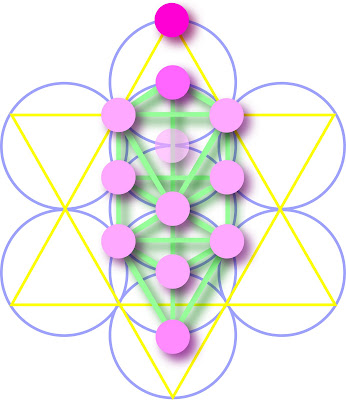

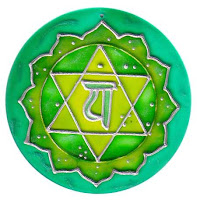

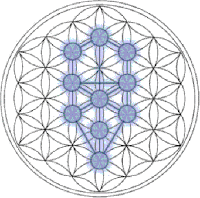

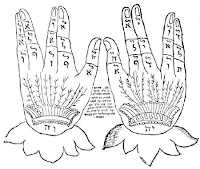

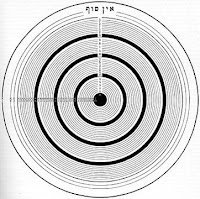
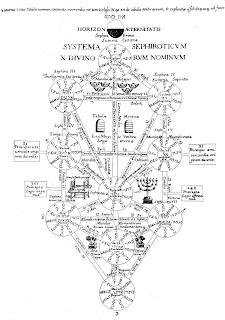
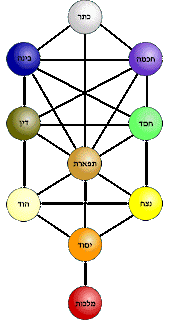
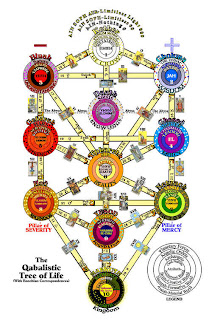

0 Comments:
Post a Comment
Subscribe to Post Comments [Atom]
<< Home